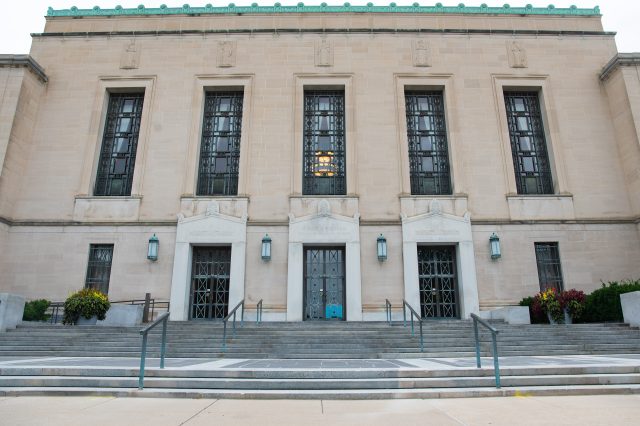[ad_1]
Nandi Comer, current Poet Laureate of the state of Michigan and LSA alum, spoke to more than 60 University of Michigan faculty and students at the Rackham Amphitheatre about her experiences and work in poetry Tuesday evening. The event was organized by the U-M Institute for Humanities as part of the institute’s Marc and Constance Jacobson Lecture series.
Comer graduated from the University in 2001 and has since been recognized for her poetry, which explores themes of race, gender and identity. She was named Michigan’s Poet Laureate by the Library of Michigan in 2023. At the lecture, Comer touched on her experience as the first woman and person of Color to serve as the Michigan Poet Laureate.
During her undergraduate education at the University, Comer was not admitted into the University’s Creative Writing and Literature program. She shared with the audience how despite feeling discouraged by this decision, she continued to pursue her passions in poetry and writing.
Comer said in an interview with The Michigan Daily her goal for this event was to encourage young writers and individuals who are still working towards their futures to explore opportunities and understand that their paths may not always be linear.
“My aim was to continue encouraging students who don’t necessarily have it all figured out,” Comer said. “I told the story about not being accepted into the Creative Writing program to also explain that not every opportunity is meant for you and that does not define your success. There will be other opportunities that come your way. … Sometimes you have to lose out on an opportunity to seek out other ways to get to your goals.”
Comer also recounted her experience traveling abroad in Spain as a Black woman and how it inspired her writing.
“I realized that a lot of places have not seen Black people and I started to write about that,” Comer said.
With the readings of her poems including “Ostrich Woman,” “Finding My Face in Carnival,” and “Bra Cup Abecedarians,” Comer explained during the event that she integrated her memories — as well as others’ experiences — on being Black abroad, on police brutality and on the female experience into her poetry. Comer told The Daily she aims to show identity and history through her poetry.
“I bring all of myself to a poem,” Comer said. “I’m writing about my point of view, but I’m also inviting other things like history and the experiences of others throughout history into that work.”
To Comer, poetry provides a medium for defining parts of life and the human identity that are hard to describe with words.
“Poetry, like all of the arts, is made up of people … who have decided to try to name the thing that we have not been able to name yet in our language,” Comer said. “We are interpreting the human experience oftentimes. … I have just decided to use poetry to do it.”
In an interview with The Daily, Shaunda Bunton, assistant director for Public Programming and Engagement at the Institute for Humanities, described the event as an opportunity to shed light on topics important to the world through creative means.
“It is a pleasure to bring people that are relevant and timely for the world that we are living in,” Bunton said. “It was quite appropriate to have Nandi and our youth poet come as Nandi is a youth educator committed to the poetry of young adults.”
Public Health student Apoorva Chalasani attended the event and told The Daily that poetry allows for human expression and can capture unique human experiences.
“I consider poetry as a way of expression in which humans express their own emotions and their own thoughts to the world,” Chalasani said. “Poetry is a way for people to help empathize with each other and understand each other better.”
Daily Staff Reporter Tenzin Menrinetsang can be reached at tenzinm@umich.edu.
Related articles
[ad_2]
Source link











